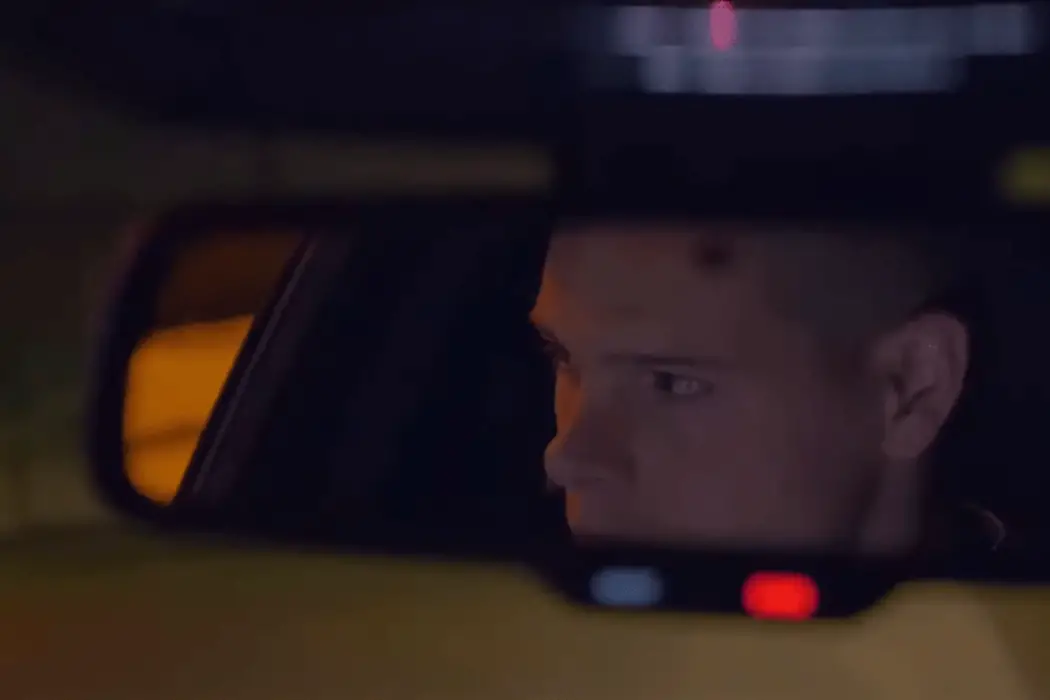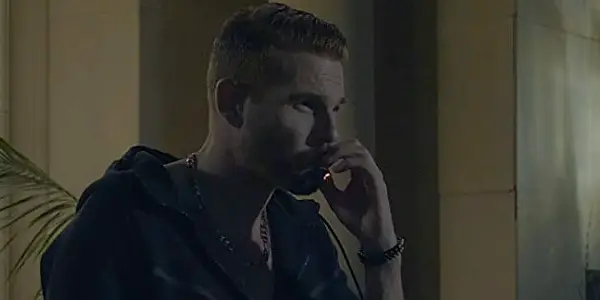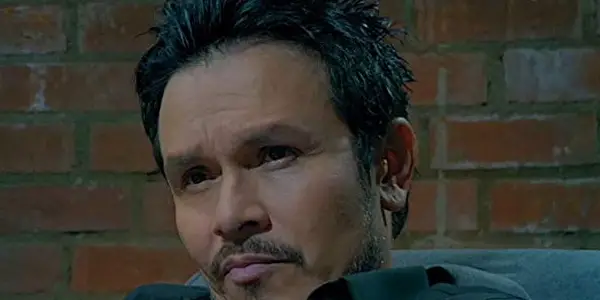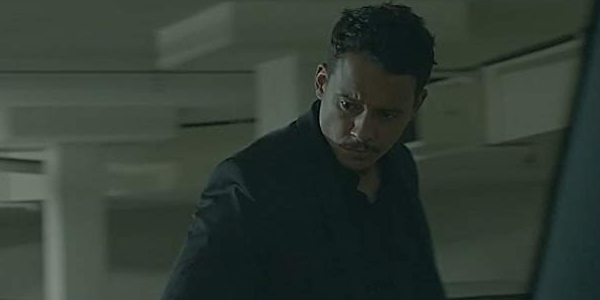THE REFUGE: Keith Sutliff’s Heist Thriller Gets The Job Partially Done

Andrew Stover is a film critic/writer from the Chicagoland. His…
A subdued and gloomy glance at a getaway driver/gunman for hire, who speaks very few words, operates in a desultory fashion whenever given a job, and is damn good at getting away from a heist unscathed and unfollowed. Keith Sutliff once again effectuates his next project with laudable dedication, taking the helm as the writer, director and leading actor of The Refuge. With enough voice, Sutliff achieves a distinct mood and filmmaking technique, managing to belittle the clamorous Drive comparisons that are destined to emerge and make such grating comparisons feel a bit more trivial. After all, The Refuge is not at all one expects — and whether or not that’s refreshing depends on the viewer and what they seek in heist thrillers. In all honesty, though, I don’t think a lot of people want to tolerate a thriller like this one.
In The Refuge, all violence is muted and handled off-screen, all of the hiccups are expressed verbally and never shown, and the dialogue is rather restricted (almost deterring from dramatic scenes). Whether or not this method was utilized to keep production cheap, doesn’t matter to me. It nicely tinkers with audacious camera work, Federico Vaona‘s hypnotic score, and a glistening Los Angeles — which instead of sketching a city of dreams and brimming success, hides behind a masked underworld, run by criminals chasing their own unlawful desires and simply trying to make ends meet.
Living in this crooked L.A. world is tight-lipped and reticent getaway driver Markus Hunter (Sutliff), somebody who’s so good at his job, he appears bored by it because he’s able to do it immaculately. No cops are ever on his tail, and his reputation as a getaway driver is perpetually growing. The film initially opens up to Markus sitting in a car, listening to a voice on the phone aggressively notifying him “You’re f*cking dead!”. This kind of opening acts as some snippet of intrigue, predominantly because the film will clearly be revealing the occurrences inspiring this forbidding scene in the car. Recently tasked another job, the introduction of Markus is driven by ten minutes of him following a van until finally murdering the subject when the van halts. The murder is off-screen. In fact, every murder and complication is off-screen or kept at a distance. No punches or blood is ever shown, and no screams, gunshots or labored sighs are ever heard. It’s a sensible direction when handling a limited budget but questionable when taking into account The Refuge is a thriller (and it has to supply the viewer with intrigue and grittiness).

Working with several gangsters/wannabe criminals in his career, it’s a hollow gangster named Frank (Julien Cesario), who keeps Markus on speed dial. Frank asks for a moment of Markus’ time. Hesitant at first, Markus does agree to meet because of their past. Face-to-face with Frank, Frank immediately attempts to do some small-talk but an evidently annoyed Markus refutes Frank’s efforts. Eventually, Frank gets right to the point. Frank provides Markus with a file ridden with the name Vernon Boyd (Tien Pham), an old accomplice of Frank’s who recently got out of jail. He cunningly stole $12 million from a casino, and he also owes Frank his share of the money from a job they implemented before Vernon went to jail. Frank entices Markus by expressing how big the payoff will be if he chooses to accept the job, and it does ultimately work. As expected, while trying to smoke out the cash by working with a surprisingly convivial thief named Watts Riley (Matthew Webb), things quickly go south.
Putting It In Park, Laying Out The Map
The Refuge is an equanimous and quiet effort in divulging the behind-the-scenes craft and backstage planning that goes into formulating the perfect heist. Instead of compiling frenetic car chases and shootouts, Sutliff finds comfort in the layout and practicality of accomplishing the heist. Markus spends most of the picture driving and seeking the best roads and routes to get away without a trace. Markus drives in silence: no music, no talk show radio, just the coruscating sight of neon-lit signs that plague Los Angeles.
In a way, The Refuge is an unexpected love letter or scrupulous portrait of the City of Angels. Errol Webber Jr.’s (The Mason Brothers) arresting cinematography captures Los Angeles through a gorgeous, sheeny yet equally nightmarish lens, where coats of darkness are scattered throughout the glistening city. “But you know this city, a lot of talk not a lot of walk. Trying to have fun, trying to live under the sun.” Sometimes excessive, the dialogue can be stilted, particularly when L.A. is being discussed. However, L.A. is the ideal city to deploy the inscrutable character of Markus. Let him roam free and do what he does best: let him drive!

Obviously, that exclamation point is a clear exaggeration. As I said, Markus follows cars but car chases they are not. But his driving dexterity is convincing because Markus is spending prolific time finding the shortcuts, the roads and the entrances/exits that’ll prompt his escape from the crime scene. The city of Los Angeles proves to be an enticing backdrop for stories tackling a criminal underworld. When it comes to Markus’ long drives at night, the camera is positioned near the back of the car, looking out the window, making viewers feel like a passive passenger. And that’s how the entirety of The Refuge is presented. We see what Markus sees but from the perspective of the passenger. We tag along on his illicit endeavors but refuse to intervene in any of the violence. This is a blessing and a curse. A blessing because the camera is used distinctly, but a curse because nothing is effectively shown or expressed.
In a heist, it’s all about the set-up, and The Refuge fully embraces this fact. Sutliff stays in character and rigorously analyzes the most effective methods to perform the heist. Regrettably, this kind of application is based on personal taste, and to the wrong crowd, it can be perceived as boring, uneventful or dull. I would be lying if I said I wasn’t losing interest at a point either.
A Novel Perspective, Laced In Atmospheric Dread
Markus is a glassy and taciturn character. His inability to commit to a conversation, or even emit a feeling of excitement really does render him lifeless. But that’s what Sutliff is going for. Granted, more fervency and facial response could have built more layers upon his character because it’s never wholly certain how Markus feels about his work, but it’s the atmosphere that amplifies the perspective. Sutliff exudes impenetrable stares and responds with a few words despite needing to collaborate with other people to execute a heist. Watts Riley comes along as Markus’ partner in crime, and instead of being this beastly and menacing thief, Watts is a family man trying to secure enough money for his family. Webb and Sutliff have middling chemistry, somewhat enjoyable because they’re complete opposites. Webb’s character is garrulous and zealous while Sutliff’s character is reserved and seemingly bored. Webb exhumes energy from within a scene only showcasing Markus and his emotional vacuity.
Sutliff uses the City of Angels to transmit the light and optimism, as well as the debilitating dreams (whether or not those dreams are prohibited by law, doesn’t matter), to ultimately trace an atmosphere infused with brimming uncertainty. No matter how deft Markus is at driving, the outcome of Markus’ heist is still fairly undetermined. Sutliff arranges the camera to highlight the application of light: showing areas of L.A. bursting with neon-lit signs and lustrous lights, while other spots are overwhelmed by utter darkness. This aesthetic choice is spellbinding and keeps the perspective of the film from collapsing, even when Russian mobsters with bad accents and genre clichés reveal themselves. Even in a city of dreamers (criminals have dreams too), darkness and dejection can still overlap.
No explosions, no chases and no fragments of vivid violence, the tension still lingers in the air. The electronic and grunge-soaked score sustains the dubiety of Markus’ job, while the cinematography conserves the illusory aura of Los Angeles. Being a cold-hearted crime picture, Sutliff’s unconventional stance on getaway driving (the punctilious preparation required) happens to fuel suspense based merely on how it elicits authenticity. This film’s reality is definitely tough and unapologetic — unveiling a network of ruthless mobsters and all — but the fashion in which Sutliff steers the narrative can be burdensome because very little happens (in terms of plot, that’s an issue). Although I’m now convinced I can’t be a getaway driver, mainly because I would just put the car in drive and then drive, not knowing where I’m going because I wouldn’t have Markus’ layout.

Even though Sutliff’s portrayal of Markus may perpetuate his vision, Markus is still vastly uninteresting to carpool with. Markus only cares about a woman named Staci (Reine Swart), but their relationship is ill-conceived. Patently, Staci is going to become an emotional obstacle or actual hostage, and Markus is going to have to rescue her or persevere for her. Clichés do add up, Russian mobsters do surface and the payoff is cursory and flimsy. After all of the driving and the boiling conflict with Frank, whose threats are terribly on-the-nose (“Don’t you ever, ever mistake my kindness for weakness.”), the brisk conclusion doesn’t provide the intended impact. The ending wants to paint the cruelty Markus has to effectuate for the sake of protecting those he loves (which is only Staci, I guess), further eternizing his moral defeat, but the pace suffers. The final moments are filled with clichés, but extending and in this instance showing the concluding violence could have magnified the actions Markus is forced to administer (which will end up rendering his moral failure tactile).
The Refuge Finds Shelter In The Planning And It’s Refreshing
Getaway driving is more than just putting the car in drive and steering away from the direction of cops. It takes thorough preparation and reflection in figuring out the best routes and passages. The Refuge is an unusual approach in exploring a getaway driver and a heist. The camera work is immersive, plunging viewers to feel like they’re a passenger viewing the events from the inside, never fully looking in or interfering with the depravity. This execution will irk others expecting high-octane car chases or shootouts, however. Proceed with caution.
Even when Markus spends the majority of the movie preparing for a heist we never truly experience, The Refuge keeps patient viewers hooked and film lovers invested by maintaining a harsh and eye-catching atmosphere and storytelling angle. But that’s not to say the lack of violence and excitement is slightly disorienting, especially considering the payoff isn’t satisfying. For the most part, however, The Refuge is still a unique heist movie, not actually showing the heist. Sounds deceitful, but Sutliff’s viewpoint is something hardly seen in modern heist movies. Pushing aside the swift pace, genre platitudes and characters who are essentially walking clichés, there’s a lot of burning fuel in The Refuge, even when it’s in park for the bulk of the movie and it never speeds to greatness.
What is your favorite heist movie? Should heist movies be reasonably authentic? Let us know in the comments!
The Refuge is getting a limited theatrical release June 28, 2019, by KS Pictures. It’s being released on VOD late July.
Does content like this matter to you?
Become a Member and support film journalism. Unlock access to all of Film Inquiry`s great articles. Join a community of like-minded readers who are passionate about cinema - get access to our private members Network, give back to independent filmmakers, and more.
Andrew Stover is a film critic/writer from the Chicagoland. His film & TV reviews can be found on Film Inquiry & Film Threat.













